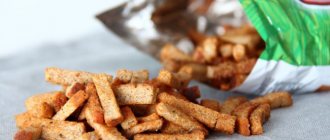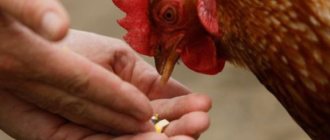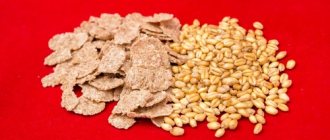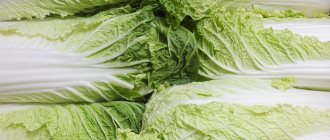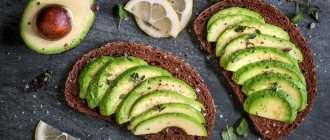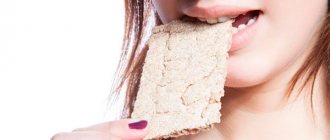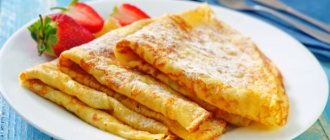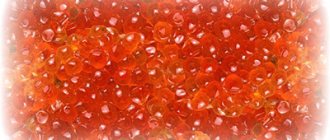Is this product suitable for mothers with breastfeeding?
The benefits of dark bread, compared to white bread, are due to the use of rye flour, which gives the product a special value. Rye flour contains an increased amount of fiber and retains most of the vitamins during baking , so eating black bread during lactation is not only possible, but also mandatory.
During breastfeeding, baked goods are introduced into the diet in small portions, monitoring the baby’s condition. You should not eat black bread in the first month of the baby’s life; during this period it is much safer to make do with crackers, which are allowed from the second month after birth.
Reference! Starting from the second month of breastfeeding, you can gradually introduce this useful product into your diet, however, taking into account some features.
The rules for eating black bread by a nursing mother are very simple:
- The first portion of bread should be no more than 10 g.
- If there is no negative reaction from the baby to the baked goods, then it is permissible to increase the daily norm to 1 - 2 slices per day.
- The product should not be too fresh; it is best to dry it with a toaster.
- It is not recommended to eat bread with spices and other additives.
- Brown bread should not be combined with meat, fatty broths, butter, potatoes, legumes and too high-calorie dishes.
Brown bread for a nursing mother: possible or not in the first month
After the birth of the baby, the young mother significantly limits her diet, stopping consuming certain foods.
Many people are interested in the question of whether black bread can be consumed while breastfeeding, and if so, in what quantities, how healthy and safe it is for a newborn. After all, even a familiar baked product can become a source of concern if you choose it incorrectly or eat more than necessary.
The benefits of bread for the body as a whole
Any bread is a source of carbohydrates and microelements necessary for humans, which are contained in grain crops used for baking.
A large amount of fiber contributes to a beneficial effect on the gastrointestinal tract, and the presence of B vitamins improves and normalizes the functioning of the nervous system.
For women who care about their skin, which is especially important after childbirth, baked goods are good for its tone, as well as muscle tone. Daily consumption of such baked goods can prevent the development of cellulite.
This is why black bread can be useful during breastfeeding, but only under certain conditions. We will look at which ones below.
Black bread for breastfeeding: nutritional pros and cons
Such baked goods, unlike white products, are made not from wheat flour, but from rye, oatmeal or barley. The calorie content is slightly lower, so many women who watch their figure prefer it.
It is also believed that black bread is more beneficial for humans, especially for a nursing mother, than white bread. What is the reason?
Beneficial properties of black bread during breastfeeding
- It has a positive effect on the digestion process, as well as the circulatory system (for a woman who has just given birth, this can prevent anemia).
- More nutrients and microelements remain during baking.
- During the preparation process, a special starter is used, which is more easily accepted by the baby’s gastrointestinal tract.
- Absorption is slower (thanks to complex carbohydrates), which promotes better digestion and does not go into fat deposits.
- In some types of black bread, part of the sugar or completely is replaced with malt, which is much healthier.
- It is less likely to contain harmful components, since it initially does not contain any unnecessary impurities. That is why it is somewhat more expensive.
Contraindications for use
However, despite the benefits of black loaves, you should also consider their negative sides, which may affect your child or you.
- When feeding a newborn, black bread causes increased gas formation in him or the nursing woman.
- Women after a caesarean section are not recommended to eat black bread for some time.
- It is not recommended if the mother or child has problems with the digestive tract. This is especially important during the period of exacerbation of the disease.
- Sometimes baking made from rye flour provokes heartburn in a nursing woman. In this case, it is also better to exclude it from the diet.
Types of black bread
As mentioned above, black bread refers to that which is made from rye, oatmeal and other flour. Most often, half of the total amount of wheat flour is added to it. Other components include the addition of molasses, malt, cumin, sesame, various seeds, etc.
The most popular varieties are “Borodinsky”, “Darnitsky”, “Rizhsky”, etc. Of course, almost every city has its own names and types. For a nursing mother, when choosing, you should be guided by your own preferences and the quality of the product being manufactured.
How much black bread can you eat without harm?
When breastfeeding, black bread, like any other product, should be included in the diet gradually. Even if a woman has never had any reaction to it, the baby may react with colic and increased gas production.
Otherwise, you need to look at your weight and desire to get in shape. If you have gained a small amount of kilograms, then the amount of baked goods consumed can be left at the same level.
To avoid gaining excess weight while breastfeeding, bread consumption should be reduced to one or two pieces per day.
Also monitor your condition. A fresh product can cause constipation, which is especially important for a woman after childbirth. If you have this problem, then use slightly dried bread or yesterday's bread.
Thus, now you know whether a nursing mother can eat black bread and in what cases it is better not to eat it. Despite this, if you don’t like flour too much or don’t eat it at all, then you shouldn’t experiment. Even during feeding, you should not forget about your own comfort, because your baby feels your entire mood.
When breastfeeding, black bread can easily be replaced with something else that is more suitable to taste. And if you want to cook it at home, there are a lot of baking recipes. Be healthy!
mama-news.ru
When is it allowed to give to children and in what quantity?
Bread made from rye flour has a lot of dietary fiber and a high content of B vitamins , so after introducing complementary foods, a nursing mother has a question about including this healthy product in the baby’s diet.
Brown bread should appear on a baby's menu no earlier than 1.5 - 2 years. This limitation is due to the fact that bread made from rye flour contains a large amount of oligosaccharides, the enzymes for digesting which have not yet been developed in the stomach of babies.
The introduction of black bread into a baby’s diet should begin not with fresh baked goods, but with crackers . Dried yeast does not cause strong fermentation processes, and the cracker will serve as a kind of simulator for teething.
For the first time, a piece of dried bread should be offered to the child in the first half of the day, and then monitor his condition.
If the baby responded well to the new product, then the next day, a portion of bread is given at lunchtime with soup or vegetable puree. The daily norm for a two-year-old child should be no more than 30 g of black bread per day. By the age of three, the amount of baking can be increased to 50 g per day .
Attention! If the baby still chews food poorly and the nursing mother is afraid that he will choke on crumbs, then it is advisable to soften the bread in water or soup before serving.
What are the benefits of various other types of bread
Brown bread is of undoubted value for a nursing mother. Its variety “Borodinsky” is especially popular, which contains 2nd grade wheat flour, peeled rye flour, rye malt, molasses, yeast, salt, sugar. Rye flour has the greatest benefit: it helps improve digestion and has a beneficial effect on the circulatory system. Products made from rye flour are a source of vitamins E, PP, and group B. Due to the fact that some of the sugar in black bread is replaced with malt, a product made from rye flour is much healthier than white flour. According to the technology, in addition to the above-mentioned components, this type of product does not contain any additional impurities, and we can say with confidence that it is almost impossible to find “Borodinsky” with harmful additives on store shelves. It is a source of complex carbohydrates, so it can be eaten even by people who are prone to obesity. Black bread is valued as a low-calorie baked product: only 41 kcal per 100 g of product. However, there are also contraindications to its use during lactation:
- tendency to excessive gas formation in mother or child;
- postoperative period after cesarean section;
- exacerbation of gastrointestinal diseases.
Grain bread is made from whole grains. The grain is pre-soaked for 2 hours, then leaven is added to the grain, and the grain undergoes a fermentation process for at least 8 hours. It is thanks to this method of preparation that this type of bakery product is the most valuable among other types of flour products. Unprocessed cereals retain all vitamins A, B, E, PP, minerals, and amino acids. It is an excellent source of iron, iodine, potassium, calcium, sodium, and phosphorus.
Despite the high calorie content of the grain product (228 kcal), it can be consumed by nursing mothers, since it contains predominantly complex carbohydrates that do not affect body fat.
However, many manufacturers do not use the above method for preparing grain bread, but prepare it from wheat flour with the addition of soaked grain. Therefore, you should carefully read the composition of the product.
Bran bread is prepared in the same way as white bread, but according to the recipe, 1/3 of the wheat flour is replaced with bran. The coarse shell of the grain (bran), which is removed during the preparation of flour, is an irreplaceable source of vitamins B and E. It contains fiber necessary for the normal functioning of intestinal motility.
When choosing bran bread, you should pay attention to the cut: if the product has a uniform consistency, slightly tinted with a dark color, then it is a fake. Real bran bread will have visible particles of bran in the cut.
Like grain bread, this type of product is high in calories (285 kcal), but its high nutritional value and benefits for the body make it indispensable in the diet of a nursing mother.
Product Features
Bakery products are a source of valuable substances necessary to strengthen the human body.
A fragrant loaf of black bread is rich in essential amino acids, microelements (magnesium, iron, potassium), plant fibers, mineral salts and a whole complex of vitamins (B, PP, C), making this product so necessary in the diet of a nursing mother and child.
Benefit
- A large amount of fiber improves food absorption, stabilizes the gastrointestinal tract and relieves constipation.
- Dark bread is rich in microelements such as magnesium and iron, which prevent anemia and contribute to the full development of the child.
- According to scientists, women who eat black bread instead of white bread are three times less susceptible to diabetes.
- The grains - the shells of the germ of rye cereals and the vitamins contained in the product - strengthen the nervous system, normalize metabolism and strengthen the immunity of the mother and her baby.
- Complex carbohydrates help your baby's growing body produce energy.
- While chewing a piece of bread, the baby develops the jaw apparatus and the process of cleansing the mouth of pathogenic microbes occurs.
- B vitamins, generously contained in bread, help the child’s body grow and develop, relieve irritability and increased excitability.
- Plant proteins improve the absorption of nutrients.
- Black bread has few calories, so it is recommended for mothers who are overweight.
- The pleasant aroma of dried bread improves appetite and stimulates the production of digestive juice, which promotes better absorption of food.
Important! In addition to its many beneficial properties, black bread can harm the body of a nursing mother and baby.
Harm
- Bakery products are contraindicated for mothers and babies with gluten intolerance, gastritis with high acidity of gastric juice, gastroenteritis, increased flatulence and in the first months after cesarean section.
- Black bread takes longer to digest, so in case of digestive problems and during periods of exacerbation of diseases of the gastrointestinal tract, this product is consumed in minimal quantities.
- If you eat bread with meat, sour foods, fatty broths and milk, this can cause heartburn.
- Excessive amounts of dark bread consumed by a baby can cause colitis.
- Brown bread should not be included in the menu of an infant under 1.5 years old, since the small body is not yet able to digest it.
Benefit
- This product contains enough fiber, and this prevents processed food residues from remaining in the body - that is, you will not suffer from constipation or bloating, and in addition, it is better to absorb the food you receive.
- It contains important elements that help the full development of the baby - magnesium and iron.
- If you eat dark instead of white during the entire breastfeeding period, you can protect yourself and your baby from the risk of diabetes in the future.
- If you prefer whole grain counterparts, this only increases the benefits. The shell of whole grains is full of vitamins that will improve the nervous system, also improve metabolism at the cellular level, and additionally form good immunity from the first years of life.
- Carbohydrates are essential for maintaining energy balance and improving mood.
- Dark flour contains a lot of B vitamins, which have a positive effect on the entire body, as they promote normal growth and development, as well as calm and relieve increased excitability. This reduces the risk of your child developing attention deficit disorder in the future and additionally protects your nerves.
- This food contains a lot of vegetable protein. It is safer for the heart than animal milk and is well absorbed by the body.
- The dark one has fewer calories than the white counterpart, so you can stick to your diet if you've gained weight after giving birth, and don't deprive yourself of toast in the morning.
- If you dry a piece in a toaster or in a dry frying pan without oil, the product releases a pleasant aroma, which stimulates the production of gastric juice, and therefore contributes to the normal digestion of food.
Read also: What kind of cookies can a nursing mother eat: baby, shortbread, biscuit
How to choose and where to store?
To buy high-quality black bread for a nursing mother and child, it is important to pay attention to the date of manufacture, packaging, composition and appearance .
Bread left lying on the counter will not be beneficial, and a quality product should not contain dyes, preservatives, taste improvers, flavors, seasonings or other additives.
It is not recommended to purchase baked goods for a nursing mother with the addition of various grains , because the baby’s reaction to them can be unpredictable.
The packaging must be sealed and transparent so that the appearance of the product can be assessed.
The loaf of bread should be the correct shape without dents or burnt areas . Foreign inclusions, brown and black specks are carbon deposits that can contain a large number of carcinogens.
Brown bread must be stored separately from other types of bread and for no more than 48 hours.
What kind of bread can you eat while breastfeeding?
Bakery products are always a special topic for women, because controlling your weight comes first for any woman.
But what to do when it comes not only to the figure, but also to the health of the child, because if you are breastfeeding, then it is important for you to know what kind of bread is possible while breastfeeding? There are many varieties of bread products, but not every one is useful for a nursing woman; what is needed and what is not allowed when feeding is further in the article.
Is it possible to have bread while breastfeeding?
To answer this question, you need to know exactly how bread affects the health of a nursing mother and whether it benefits her and her baby. We all know very well that “bread is the head of everything” and our daily diet cannot do without its use.
This is because this product is nourishing, tasty and good for our health.
The flour product contains:
- vegetable protein;
- cellulose;
- complex carbohydrates;
- B vitamins.
All these elements have a beneficial effect on the body, because they give it the energy necessary for an active life, have a positive effect on the functioning of the gastrointestinal tract and enrich it with essential amino acids.
All this suggests that bread can and should be consumed during breastfeeding, but you need to know the limit, some features of its consumption, and also be able to correctly determine for yourself which bread is better for breastfeeding.
What kind of bread can a nursing mother
As we said above, there are several types of bread. We will try to look at each type in more detail to understand how it affects the body of a nursing mother and whether it will harm the health of the newborn.
White bread during lactation: pros and cons
This bread variety is made from flour (wheat) grades 1 and 2. This flour is completely refined, so it contains practically no useful substances, but the calorie content and glycemic index are quite high.
A high calorie content is fraught with the risk of gaining extra pounds, and a high GI (glycemic index) is dangerous because it increases blood sugar levels. The insulin that is produced in this case interferes with the complete breakdown of fats in the body, that is, it practically reduces this important process to “no”.
The conclusion follows: white bread is tasty, but there is no benefit as such.
For a newborn, his mother's consumption of white bread is fraught with bloating and constipation. That is why it is not advisable to eat white bread products while breastfeeding; in extreme cases, eat them in small quantities and infrequently.
Is it possible to eat black bread while breastfeeding?
Dark bread is usually made from oatmeal, rye or barley flour. Its composition sometimes also includes: malt, 2 grade wheat flour and molasses.
This type of bread is much healthier than white bread, and in terms of calorie content it “weighs” less. The starter that is added when baking black bread is almost always easily accepted by the baby’s body, so it can be consumed by a nursing mother.
However, there are also contraindications:
- gastrointestinal diseases during exacerbation;
- the first months after cesarean section;
- the tendency of the mother or newborn’s body to flatulence.
Only if there are contraindications should you avoid eating black bread during breastfeeding.
Is it possible to have bread with malt while breastfeeding?
This type of bread is very healthy; it contains a rich mineral and vitamin complex, which has a beneficial effect on the taste of the finished product. But despite this, it is not worth using it often. Of all malt varieties, choose dark ones and eat them no more than once a week, in an amount of 1-2 slices.
Are crispbreads good for breastfeeding?
Crispbread is a dietary product and is deservedly classified as a healthy food. It is low in calories and rich in fiber. In addition, during production, the breads are subject to special processing, which allows them to preserve all their beneficial natural properties. Based on this, we can conclude that bread can be eaten with gw, but not more than 150 grams per day.
Is it possible or not for a nursing mother to eat bread with bran?
Multigrain products, as well as products with bran, are ideal for a nursing diet. They contain everything that the body of a mother and a newborn baby needs, the product is very useful and cannot harm them. So it is necessary to consume bread with bran during lactation.
How to choose bread when breastfeeding a newborn
After we have found out which bread is best for breastfeeding, it’s time to talk about how to choose it correctly. Fresh, just out of the oven, and made 1-2 days ago will have different effects on the body of mother and child.
To understand which type of baked goods is best for you, carefully read the detailed tips on their selection and consumption.
- Warm, completely fresh bread should not be consumed by nursing mothers who are prone to constipation. Freshly baked loaves strengthen the stomach, so the problem with constipation can only get worse.
- In this regard, it is better to give preference to yesterday's bread, it stimulates digestion. However, if a woman suffers from gastritis, ulcers, dysbacteriosis, and also has a tendency to flatulence or diarrhea, then it is better to completely avoid such bread or reduce the amount consumed to a minimum.
- You can only consume fresh (not expired and not lying on store shelves for a long time) and well-baked product. It’s easy to check both indicators: if, when you press on the bread, its shape is quickly restored, then the product is baked properly; if the product is slightly deformed, it means it is raw.
4. As for the freshness of the product, the date of its manufacture and expiration date can be found on the packaging, if the bread is sold in a plastic bag. If the product is sold without a bag, then determine freshness by touch: fresh bread will definitely be soft, if it has been lying around for a long time, it will therefore be hard and dry.
5. Always choose only that bread product that does not contain spices, does not smell like baked goods and does not have too large crumb pores. If this is not the case, it means that dough improvers, special substances for activating yeast and harmful aromatic additives have been added to the baked product. All these substances are dangerous to health and can become potential allergens for the baby.
Features of eating bread when feeding a newborn
There are not many rules for a nursing mother’s consumption of bread, but they exist, and every woman should know them. To protect your child and not disrupt the functioning of his digestive system, always follow these recommendations:
- New varieties of bread should be introduced gradually into the nursing diet. Do not combine different types of bread in your menu at the same time. If you plan to eat several baked goods, then eat them in turn, after monitoring your baby’s reaction to one or another type of bread product.
- Try to eat a slice of your favorite product in the morning and monitor your child’s condition throughout the day: if there are no negative symptoms, then eat another slice the next day. If this time the baby reacts positively, you can safely eat the bread in the permitted quantity.
- It is quite possible to eat bread from a nursing mother in the first month of lactation, but it is better to reduce the daily amount during this period by half (especially if we are talking about the white variety).
- It is not recommended to combine white bread with fatty foods: meat, butter, sauces, broths, etc. If desired, the bread can be dried a little using a toaster or oven.
Now you know for sure that you can and even need to eat bread during breastfeeding. Another question is what kind of bread is possible while breastfeeding? Our article also has an answer to this question, but do not forget that the recommendations are rather conditional and generalized.
Each person’s body is individual, and what is ideal for one person is absolutely not suitable for another. Therefore, it would be very good if you consult your doctor before consuming it so that he can give you good advice regarding nutrition. And, of course, do not forget to listen to your body - it is your best adviser in any situation.
Be healthy!
tvoi-povarenok.ru
Is it possible for a nursing mother to have grain bread in the first month?
The benefits of products for the body of a nursing woman and her child directly depend on their composition, because everything that the mother eats gets to the baby after some time.
Grain bread during breastfeeding is no exception - due to the fact that it is made from whole grains, the content of vitamins and minerals in it is quite high. This determines its usefulness during breastfeeding.
Basic properties of whole grain bread
The main difference between grain bread and regular bread is the cooking technology. Grain bread is made from whole grains that are not first ground into flour. A characteristic feature is the fact that the shell of the grain is not removed when baking grain bread. This adds beneficial properties to grain bread.
Grain bread contains grains, water, milk and salt. This suggests that all ingredients are safe for breastfeeding women. But often manufacturers add various spices, honey, sugar, butter, etc. to it. Therefore, when purchasing, you must pay attention to the composition of the product indicated on the label.
Grain bread is made from almost any cereal crop, but the most common is the use of rye flour in its preparation.
The calorie content of such bread is quite low, which determines its widespread use in dietary nutrition. It is 230 kcal / 100 g of product.
What are the benefits of grain bread during lactation?
Grain bread includes the maximum amount of useful substances that are in the grain from which it is made. After all, when baking regular bread, only the inner part of the grain is used, and the shell is removed. In this case, a significant part of the beneficial microelements is lost. In the case of grain bread, the entire grain is used, which means that almost all of its beneficial properties are preserved.
Grain bread has a rich vitamin and mineral composition. Among all existing types of bread, the largest amount of vitamin B is found in grain bread. It contains vitamins of groups A, B, E, PP, as well as trace elements iron, iodine, calcium, potassium, magnesium, sodium and many others.
Among the beneficial properties of whole grain bread during breastfeeding, the following advantages of the product can be highlighted:
- Has a beneficial effect on the gastrointestinal tract of mother and child. Helps normalize metabolism.
- It has a positive effect on the intestines, improving its microflora. Helps remove cholesterol from the body.
- Positively affects the nervous system. Even a few pieces of this bread improve the mood and contribute to the emotional release of a young mother. Reduces the likelihood of overexcitation in a child.
- Helps normalize the functioning of the cardiovascular system.
- Helps improve the functioning of the liver and kidneys.
- Cereal bread has enormous energy value. Its use gives a nursing woman a boost of energy for the whole day.
- Due to its high fiber content, it is considered a dietary product, and in moderate quantities contributes to weight loss, and therefore a slim figure. Saturates the body for a long time, being absorbed gradually.
Harm of whole grain bread for a nursing mother and baby
The benefits of grain bread during breastfeeding are very high. Therefore, it has practically no contraindications.
Possible harm that grain bread can bring to women with gastrointestinal problems.
The reason for this is the technology for baking such bread, due to which it contains a large number of bacteria, which also enter the bread along with useful substances. But this will not do any harm to a healthy stomach. If you have serious illnesses, this may become a contraindication for use.
Naturally, it is not recommended for a nursing mother to consume grain bread indefinitely. In large quantities, it can lead to obesity and also lead to a lack of balance of nutrients in the body of the mother and child.
The permissible one-time consumption of grain bread is 2 - 3 pieces (about 60 g), daily - no more than 5 pieces (about 100 g).
How to choose and eat grain bread during breastfeeding
Grain bread can be included in the diet of a nursing mother from the first days of a child’s life. You should start with half a piece.
If a child experiences any adverse effects or disturbances in the functioning of the stomach, then grain bread should be excluded for a month. Then you can try again in the same way. But these phenomena are very rare when a nursing woman eats grain bread.
- When choosing grain bread, it is important to pay attention to the production time. The bread should not be too old.
- The product should not contain any products prohibited during lactation.
- Also, the technology for preparing grain bread is very important. The proper process for making it involves pre-soaking the beans for several hours. In addition, its fermentation after adding the starter must last at least 8 hours. Some manufacturers neglect these requirements, which reduces the amount of useful substances in its composition. Of course, it is impossible to trace the manufacturing technology with the naked eye.
When buying grain bread, pay attention to its color (it should be a natural shade), smell (without specific moldy or sour odors) and the density of the bread (grain bread has a harder, more uniform structure).
The right type of bread can bring great benefits to the body of mother and baby. One of the most acceptable types of bread is grain bread during breastfeeding, but even such a healthy product should be consumed in moderation.
mama-news.ru
